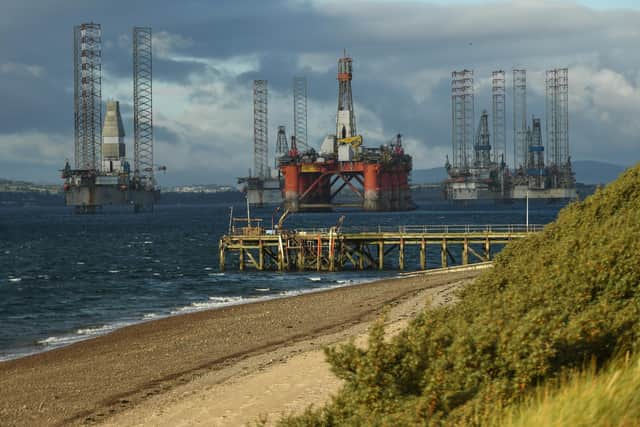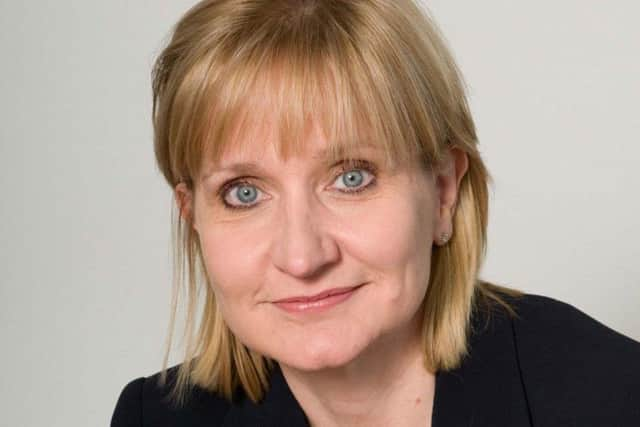Outgoing boss of oil and gas trade body warns against 'environmental populism' amid North Sea debate
Deirdre Michie, chief executive of Offshore Energies UK (OEUK), formerly Oil and Gas UK, said it was important not to be distracted by a "single-issue approach".
It came as she warned the decision to increase the windfall tax on oil and gas companies was a "tax too far" that had "rocked investor confidence". Chancellor Jeremy Hunt previously announced the energy profits levy would rise to 35 per cent and remain in place until March 2028.
Advertisement
Hide AdAdvertisement
Hide AdMs Michie said Labour's plan to expand the tax further – by backdating it to January and scrapping the investment allowance – would send "shockwaves" through the industry and beyond.


She will address OEUK's annual general meeting in Aberdeen on Wedneday, where former New Labour spin doctor Alastair Campbell is also expected to speak.
Ms Michie, who was appointed in May 2015, will stand down at the end of the year, with her replacement due to be announced this week. She has represented the industry through two downturns, the Covid pandemic and the COP26 climate summit in Glasgow.
Speaking to The Scotsman, she said the industry "absolutely recognises" the economic situation and the impact on consumers, households and businesses. But she said investor confidence had been shaken by the windfall tax.
Ms Michie said: "The concern is it will be there even as the industry goes through its cycles that we always know it goes through. What goes up comes down in our sector, very much so. And so the concern is that the windfall tax will remain when there's no windfall to tax. So as a result that investor confidence has been shaken, and companies are going 'hang on a minute, this is getting too challenging’."


She said the impact of the tax would start to "bite" in 12 to 18 months.
Labour leader Sir Keir Starmer has announced plans to backdate the tax and scrap the investment allowance, which his party calls a "loophole". It allows companies to claim 91p in tax savings for every £1 invested in the North Sea.
Asked about these plans, Ms Michie said: "To retrospectively introduce something wouldn't just send shockwaves through this sector, it would be across all sectors and for the UK generally. Retrospective taxes are something that shouldn't be contemplated if you want to have businesses feeling that this is a place that they want to invest in, and I don't just mean for our sector."
Advertisement
Hide AdAdvertisement
Hide AdShe said investment allowances were an important part of the way business is done, adding: "To take it away, I think it would undermine the very foundations of how people do business."
Ms Michie continued: "The way it's portrayed is that it's giving the industry money, but it's not. It's the way business is done. And I just think we have to be careful that we aren't distracted by single-issue – what is environmental populism, actually, and just remember there's a bigger picture that we're all trying to drive towards, which is actually about delivering net zero by 2050."
Asked what she meant by environmental populism, Ms Michie said: "It's like saying if you just stop oil, everything else will sort itself out. It's that single-issue approach, which sounds very compelling, but the reality of just stopping oil won't stop the demand for oil.
"We could shut down tomorrow – the demand wouldn't go away. All we'd have to do is then import it all.
"And OK, some people might then feel better about it – hundreds of thousands of jobs gone, taxes lost – but then for me, the irony of that is your emissions would go up. And that for me is the absolute just no-no. Why would you do that when the demand hasn't gone away?
"So you've got to do both. You've got to be reducing your emissions in terms of what you produce, and you've got to be reducing your demand. And I don't think we have enough conversations about demand management."
Asked what she thought of the political climate around oil and gas in Scotland, Ms Michie was silent for several seconds and joked her Zoom had frozen.
She eventually said: "I actually believe that the Scottish Government does recognise the role of oil and gas and the positive role it plays in the transition."
Advertisement
Hide AdAdvertisement
Hide AdShe added: "They know that it's the same people who do oil and gas as are putting in the wind farms, as are driving carbon capture and storage, and they know they need those skills and the companies and the investment. I actually think they do support – I think where they do put the pressure on us is to move even faster than perhaps we think is doable. So that's where, I think, the tension comes."
Mark Ruskell, the environment spokesman for the Scottish Greens, said: "It is right that we need to look at reducing demand for oil, but that isn't going to happen if we continue with business as usual and with new oil exploration licences being approved left, right and centre. The situation we are in is urgent, and is being made even more desperate by the close-knit relationship between polluting governments and the fossil fuel lobby.”
Comments
Want to join the conversation? Please or to comment on this article.
